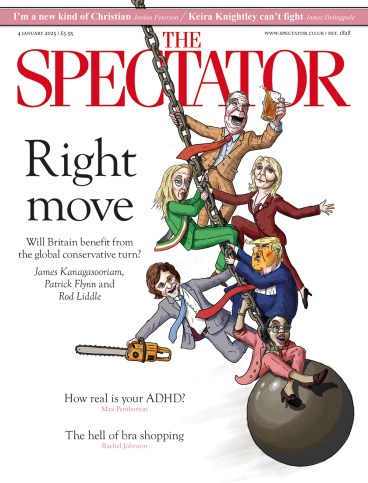
Lying in bed pissed on Boxing Day night, I was visited by the ghost of Christmas Future, dressed in a grey jacket with a velvet collar, hovering over my pit cackling and in a similar state, alcohol-wise, to myself. It seemed very happy, this ghost. It led me to a graveyard where it pointed, in jubilation, at a headstone which had the words ‘Kemi Badenoch 2024-2026’ on it. ‘You shouldn’t joke about people passing away, Nigel,’ I told this phantom a little sententiously. ‘She’s not actually dead, you idiot,’ replied the wraith, lighting a fag. ‘It’s a metaphor.’ When I awoke 12 hours later, my mobile phone flashed a message inviting me to join Reform UK, Europe’s fastest-growing political party. Incidentally, on the same night, my eldest son had a dream in which Ed Miliband was named as the new manager of Millwall and was relentlessly barracked by the crowd at The Den for his catastrophic net zero formation.
I suppose it was galling for Badenoch to hear Farage crowing, but she was unwise to take the bait
I suspect Sir Keir Starmer had a comparatively pleasant Christmas, despite having wrecked the economy and being about as popular with the voters as an Anglican priest who has just nonced a few altar boys. The sight of the leader of the opposition and Nigel Farage knocking seven bells out of each other will have cheered him considerably and comprised, in its own way, another Ghost of Christmas Future – Christmas 2029, when the right-of-centre vote is almost precisely divided between the Tories and Reform, leaving Labour still the largest party and able to make a deal with the absurd Liberal Democrats. That was precisely the scenario invoked by the latest mega poll. Of course, things can change. The question is how and why.
I suppose it was galling for Badenoch to hear Farage crowing that the number of Reform members now exceeds those in the Conservative party, but she was a little unwise in taking the bait. A quick riposte about it all being a temporary phenomenon and that Reform still finds it difficult to climb above 25 per cent nationally would have been sufficient, surely. Instead, Kemi denounced the whole thing as a fake, adding: ‘Farage doesn’t understand the digital age. This kind of fakery gets found out pretty quickly, although not before many are fooled.’ And so Nigel was able to respond with confected outrage: ‘I think it’s an absolutely outrageous thing for her to have said. I know she’s got a very bad temper. I know she’s well known for lashing out at people, but I am not at all happy, and I’m going to take some action.’ A smart response, homing in on Badenoch’s perceived tetchiness and which keeps Reform’s undoubted success in the public eye for a few days longer.
Further, Kemi got it wrong: the one thing which Farage and Reform do understand is the digital age. It is how the party has been created and enabled to grow, while there are still one or two old duffers on the back benches of the Conservative party who, during elections, disdain social media entirely.
This little spat revealed a number of things. First, Reform’s burning obsession with the Tories – something which at times threatens to eclipse what should be their real purpose, of winning an election. Second, Kemi’s reflexive petulance, which can sometimes be endearing but on this occasion simply made her look piqued.
But then there is the question of those 135,000 members and what change they might bring to the party they have recently joined. With Reform’s membership at £25 per year, that’s £3,375,000 coming in every 12 months: enough to build a very effective party structure. I have always had my doubts about that $100 million funding offer from Elon Musk – but hell, Reform may not need it. Further, 135,000 members means an average of more than 200 activists per parliamentary seat. Let us assume that half of them will not play an active role in the party, or may even fail to renew their membership, having joined in a spasm of lust from seeing Lee Anderson in full stride. That still leaves more than 100 activists per constituency – a transformative number. Believe me, I speak as someone who campaigned during the last election with just one activist by my side.
Farage has also been moving, with some rapidity, to dispel the notion that he would deliver to the nation an economic policy drawn from the crushed and desiccated intestines of the late Margaret Thatcher. Or, perhaps, Sir Keith Joseph. He and Richard Tice understand that this would not play well in those very winnable Red Wall seats – and so suddenly we are hearing stuff about nationalising the utilities. I don’t know how this sits, philosophically, with Tice and Farage, but that’s not important right now. They have grasped that the populist revolutions on continental Europe and in the USA with the re-election of Donald Trump are not simply ‘right wing’ or ‘far right’, as the BBC continues to put it. There is a lot of left-wing populism in the National Rally and Slovakia’s Social Democracy party and elsewhere in Europe – as there was indeed with Trump and his protectionist rhetoric. The truth is you cannot be for free trade and free movement of labour while also protecting the jobs and – crucially – incomes of the poorest quarter of the electorate. This has been an electoral problem for the Tories at repeated elections, save for 2019, when Boris Johnson pledged his government to ‘levelling up’.
The question then becomes how might this translate into votes at a general election. There are not quite enough Hartlepools to get Reform more than 100 seats, mainly down the eastern seaboard, the Red Wall and in parts of Wales. But they would not be far short of that total – leaving the Conservative tally pretty much halved and Labour still clinging on. As I say, a lot will change before then – but to whose benefit, Kemi or Nigel?
Watch more on SpectatorTV:








Comments